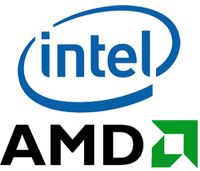Intel and AMD Declare a Truce of Sorts
By Harry McCracken | Thursday, November 12, 2009 at 9:55 am
 One of the longest-running, fiercest battles in tech isn’t exactly ending–but it’s sure entering a new phase. Today, Intel and AMD announced that they’ve reached a settlement that ends their legal wrangling (most notably AMD’s lawsuit against Intel for monopoly abuse), establishes a patent cross-licensing agreement, sets ground rules for how Intel can compete with AMD, and puts $1.25 billion of Intel’s money in AMD’s pockets.
One of the longest-running, fiercest battles in tech isn’t exactly ending–but it’s sure entering a new phase. Today, Intel and AMD announced that they’ve reached a settlement that ends their legal wrangling (most notably AMD’s lawsuit against Intel for monopoly abuse), establishes a patent cross-licensing agreement, sets ground rules for how Intel can compete with AMD, and puts $1.25 billion of Intel’s money in AMD’s pockets.
The agreement doesn’t end legal action against Intel by government officials, such as the EU’s $1.45 billion fine for abusive business practices (which Intel is appealing) or New York State’s recently-filed lawsuit.
For consumers, the major question about the settlement is pretty simple: Does it increase the likelihood of healthy competition between Intel and AMD, thereby driving greater chip innovation and lower prices so that we get the most PC possible for our money? We’ll see. But it’s fascinating to look at what Intel has agreed to refrain from doing, as reported by Cnet:
• Offering inducements to customers in exchange for their agreement to buy all of their microprocessor needs from Intel, whether on a geographic, market segment, or any other basis
• Offering inducements to customers in exchange for their agreement to limit or delay their purchase of microprocessors from AMD, whether on a geographic, market segment, or any other basis
• Offering inducements to customers in exchange for their agreement to limit their engagement with AMD or their promotion or distribution of products containing AMD microprocessors, whether on a geographic, channel, market segment, or any other basis
• Offering inducements to customers in exchange for their agreement to abstain from or delay their participation in AMD product launches, announcements, advertising, or other promotional activities
• Offering inducements to customers or others to delay or forebear in the development or release of computer systems or platforms containing AMD microprocessors, whether on a geographic, market segment, or any other basis
• Offering inducements to retailers or distributors to limit or delay their purchase or distribution of computer systems or platforms containing AMD microprocessors, whether on a geographic, market segment, or any other basis
• Withholding any benefit or threatening retaliation against anyone for their refusal to enter into a prohibited arrangement such as the ones listed above.
Basically, Intel’s agreeing not to take actions that would shut AMD out of dealing with major PC companies entirely, or hobble it so severely that it might as well be shut out. Sounds good to me. I wanna have the opportunity to choose between PCs based on a variety of processors from multiple companies.
Ultimately, AMD has always fared best when its portfolio of chips has been at its strongest in comparison to Intel’s offerings. Today’s agreement won’t have any immediate effect on its product lineup, of course. But if it increases the chances that a great AMD chip will get a great response from the industry, it would be…great.
2 Comments
Read more:













November 12th, 2009 at 4:43 pm
I’m betting Intel and AMD will have plenty more courtroom battles.
November 12th, 2009 at 6:04 pm
good news
AMD suddenly got suitcase full of needed cash to keep on running.
The bad news is
cross licensing with Intel
Since AMD already invested so much in their next generations of processors(APU) and their investment in ATI.